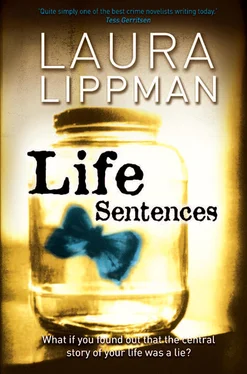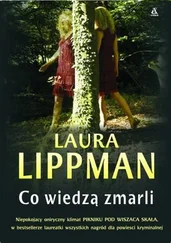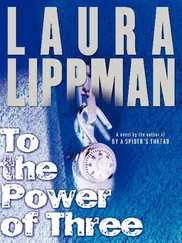Not that she could see. This novel had been cobbled together with a few leftovers from her life, the unused scraps, then padded by her imagination, not to mention her affectionate memories of The Secret Garden . (A girl exploring a forbidden space, a boy in a bed—why did she have to explain these allusions over and over?) On some level, she was flattered that readers wanted her, not her ideas. The problem was, she had run out of life.
Back in her hotel room, she over-ordered from room service, incapable of deciding what she wanted. The restaurant in the hotel was quite good, but she was keen to avoid it on this night set aside for lovers. Even under optimal circumstances, she had never cared for the holiday. It had defeated every man she had known, beginning with her father. When she was a little girl, she would have given anything to get a box of chocolates, even the four-candy Whitman’s Sampler, or a single rose. Instead, she could count on a generic card from the Windsor Hills Pharmacy, while her mother usually received one of those perfume-and-bath-oil sets, a dusty Christmas markdown. Her father’s excuse was that her mother’s birthday, which fell on Washington’s, came so hard on the heels of Valentine’s Day that he couldn’t possibly do both. But he executed the birthday just as poorly. Her mother’s birthday cakes, more often than not, were store-bought affairs with cherries and hatchets picked up on her father’s way home from campus. It was hard to believe, as her mother insisted, that this was a man who had wooed her with sonnets and moonlight drives through his hometown of DC, showing her monuments and relics unknown to most. Who recited Poe’s ‘Lenore’— And, Guy de Vere, hast thou no tear? —in honor of her name.
One year, though, the year Cassandra turned ten, her father had made a big show of Valentine’s Day, buying mother and daughter department store cologne, Chanel No. 5 and lily of the valley, respectively, and taking them to Tio Pepe’s for dinner, where he allowed Cassandra a sip of sangria, her first taste of alcohol. Not even five months later, as millions of readers now knew, he left his wife. Left them , although, in the time-honored tradition of all decamping parents, he always denied abandoning Cassandra.
Give her father this: He had been an awfully good sport about the first book. He had read it in galleys and requested only one small change—and that was to safeguard her mother’s feelings. (He had claimed once, in a moment of self-justification, that he had never loved her mother, that he had married because he felt that a scholar, such as he aspired to be, couldn’t afford to dissipate his energies. Cassandra agreed to delete this, although she suspected it to be truer than most things her father said.) He had praised the book when it was a modest critical success, then hung on for the ride when it became a runaway bestseller in paperback. He had been enthusiastic about the forever-stalled movie version: Whenever another middle-aged actor got into trouble with the law, he would send along the mug shot as an e-mail attachment, noting cheerfully, ‘Almost desiccated enough to play me.’ He had consented to interviews when she was profiled, yet never pulled focus, never sought to impress upon anyone that he was someone more than Cassandra Fallows’s father.
Lenore, by contrast, was often thin lipped with unexpressed disapproval, no matter how many times Cassandra tried to remind people of her mother’s good qualities. Everyone loves the bad boy. Come April, her father would be center stage again, and there was nothing Cassandra could do about that.
She sighed, thinking about the unavoidable trip back to Baltimore once her tour was over, the complications of dividing her time between two households, the special care and attention her mother would need to make up for her father being lionized. Did she dare stay in a hotel? No, she would have to return to the house on Hillhouse Road. Perhaps she could finally persuade her mother to put it up for sale. Physically, her mother was still more than capable of caring for the house, but that could change quickly. Cassandra had watched other friends dealing with parents in their seventies and eighties, and the declines were at once gradual and abrupt. She shouldn’t have moved away. But if she hadn’t left, she never would have started writing. The past had been on top of her in Baltimore, suffocating and omnipresent. She had needed distance, literal distance, to begin to see her life clearly enough to write about it.
She turned on the television, settling on CNN. As was her habit on the road, she would leave the television on all night, although it disrupted her sleep. But she required the noise when she traveled, like a puppy who needs an alarm clock to be reminded of its mother’s beating heart. Strange, because her town house back in Brooklyn was a quiet, hushed place and the noises one could hear—footsteps, running water—were no different from hotel sounds. But hotels scared her, perhaps for no reason greater than that she’d seen the movie Psycho in second grade. (More great parenting from Cedric Fallows: exposure to Psycho at age seven, Bonnie and Clyde when she was nine, The Godfather at age fourteen.) If the television was on, perhaps it would be presumed she was awake and therefore not the best choice for an attack.
Her room service tray banished to the hall, she slid into bed, drifting in and out of sleep against the background buzz of the headlines. She dreamed of her hometown, of the quirky house on the hill, but it was 4 A.M. before she realized that it was the news anchor who kept intoning Baltimore every twenty minutes or so, as the same set of stories spun around and around.
‘…The New Orleans case is reminiscent of one in Baltimore, more than twenty years ago, when a woman named Calliope Jenkins repeatedly took the Fifth, refusing to tell prosecutors and police the whereabouts of her missing son. She remained in jail seven years but never wavered in her statements, a very unique legal strategy now being used again….’
Unique doesn’t take a modifier , Cassandra thought, drifting away again. And if something is being used again, it’s clearly not unique . Then, almost as an afterthought, Besides, it’s not Kuh-lie-o-pee, like the instrument or the Muse—it’s Callieope, almost like Alley Oop, which is why Tisha shortened her name to Callie .
A second later, her eyes were wide open, but the story had already flashed by, along with whatever images had been provided. She had to wait through another cycle and even then, the twenty-year-old photograph—a grim-faced woman being escorted by two bailiffs—was too fleeting for Cassandra to be sure. Still, how many Baltimore women could there be with that name, about that age? Could it—was she—it must be . She knew this woman. Well, had known the girl who became this woman. A woman who clearly had done something unspeakable. Literally, to take another word that news anchors loved but seldom used correctly. To hold one’s tongue for seven years, to offer no explanation, not even the courtesy of a lie—what an unfathomable act. Yet one in character for the silent girl Cassandra had known, a girl who was desperate to deflect all attention.
‘This is Calliope Jenkins, a midyear transfer,’ the teacher had told her fourth-graders.
‘Callieope.’ The girl had corrected her in a soft, hesitant voice, as if she didn’t have the right to have her name pronounced correctly. Tall and rawboned, she had a pretty face, but the boys were too young to notice, and the girls were not impressed. She would have to be tested, auditioned, fitted for her role within Mrs Bryson’s class, where the prime parts—best dressed; best dancer; best personality; best student, which happened to be Cassandra—had been filled back in third grade, when the school had opened. These were not cruel girls. But if Calliope came on too fast or tried to seize a role that they did not feel she deserved, there would be trouble. She was the new girl and the girls would decide her fate. The boys would attempt to brand her, assign a nickname—Alley Oop would be tried, in fact, but the comic strip was too old even then to have resonance. Cassandra would explain to Calliope that she was named for a Muse, as Cassandra herself had almost been, that her name was really quite elegant. But it was Tisha who essentially saved Calliope’s young life by dubbing her Callie.
Читать дальше












